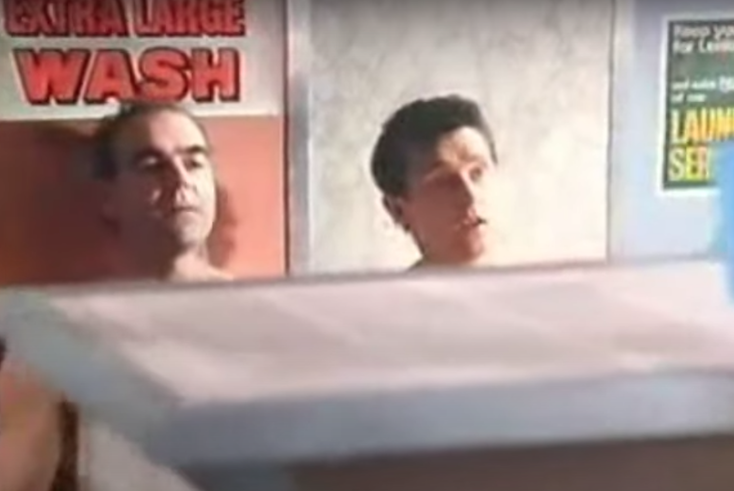Lunch snacks, parody ads and woke-ier jousts

Dominic Mills looks at what’s on the menu for ITV’s lunch, gets a thirst for Carling Black Label and asks what we’d sacrifice for a cheap bomber jacket
ITV and the lunch dilemma
If you take ITV as a rough barometer for the overall health of the media, and therefore the advertising sector, news last week that its ad revenues rose 68% last month, and could rise by 28% year on year for the first half of 2021 off the back of Euro 2021, then that is cause for optimism. We all need a healthy ITV.
But I’m more interested in another part of ITV, which is part of its attempt to fight the likes of Netflix and, essentially, involves eating its own lunch.
That is Britbox, where every subscriber to the package and every hour watched is, in a nutshell, an opportunity-to-see lost to its core advertising product.
Britbox got barely a mention last week in the broadcaster’s announcement of its annual results and you have to look hard in the report to find out much.
For the life of me, I can’t really understand why. With 500,000 subscribers as of January this year it is, ITV claims, ahead of target — although by how much we don’t know.
I couldn’t say what I expected really, except that I thought it would be lower; after all, Britbox doesn’t conjure up the same excitement as Netflix or Disney+.
Perhaps I am being too kind: in the context of the pandemic, and substantive increases in TV watching, ITV might have done better.
There’s a lot of detail missing — the average price of a sub, churn rate, cost per acquisition and, crucially, viewing time per subscriber household — but two intriguing notes: One, Britbox is now available on the Amazon platform; and two, commissioning Spitting Image exclusively for Britbox drove a 10x increase in subs.
[advert position=”left”]
The lesson there is obvious: Original programming will drive take-up, hence the recommissioning of Spitting Image this year plus some other new content.
But that leaves an obvious question too: is the Spitting Image money really best spent on Britbox rather than the established channels?
The report also reveals that Britbox is progressing in the US, where subs have increased by more than 50% and it is now profitable.
Building on this, there is a version in Australia and plans for South Africa and other, presumably Anglophone, territories.
Similarly, you have to scour the annual report for information on ITV’s other subscription product, Hub+, an ad-free version of the Hub.
The positive is that subs are 410,000 — at £3.99 a month £39.99 a year — which I think is surprising for a product that is not exactly well-publicised but, thanks to the absence last year of Love Island, is flat on 2019.
Add them up however, and on one level the gradual shift in the business model away from ad-dependence demonstrates a determination to take the fight to Netflix and Amazon.
But on another, versus 3.5+ million UK subscribers to Disney+ and 15 million or so to Netflix, it’s pretty small beer.
Rather than eating its own lunch, ITV is still snacking on the bag of crisps in the school lunchbox. This year will be vital but the dilemma remains: damned if it does, and damned if it doesn’t.
The joy of a parody
The death of Nick Kamen, star of BBH’s famous ‘laundrette’ ad for Levi’s, has prompted an outpouring of industry nostalgia and, dare I say it, not a little soul-searching along the ‘why don’t we make stuff like that anymore?’ line.
The ad, which seared across the nation’s consciousness like a 240-volt shock, made Levi’s, BBH and Kamen famous, not to mention reminding everyone of Marvin Gaye’s talent and, perhaps (or not), making white sports socks trendy — 38 seconds in here.
I can’t add to all the commentary about the ad, but it made me remember this wonderful parody by Carling Black Label.
It faithfully copies the the original right up to the end where we cut to two blokes also washing their clothes.
“I bet he drinks Carling Black Label,” says one.
“Nah,” says the other. “He doesn’t wash his underpants,” as the camera cuts to show our naked friends holding a pair of strategically placed books.
I’d lament the loss of the parody ad but it’s pointless really. Times have changed.
Parodies work if the original is really well-known — mass TV airtime is the key — and both sets of clients and agencies are willing to a) take a risk and b) have some fun.
Woke-ier than thou
In case you missed it, Boohoo announced its results last week. No surprises there: it is clearly one of the beneficiaries of lockdown.
But maybe there is one small surprise. Boohoo hit the headlines last July when a Sunday Times investigation revealed the awful conditions — including wages of £3.50 an hour for some — at Leicester garment factories that are part of its supply chain.
Well, you’d think, this is exactly the kind of issues Boohoo’s millennial, influencer-led, audience cares about: sustainability, social justice, supply chain responsibility — and all on the consumer’s doorstep too.
Apparently not, despite a social media backlash.
Over the year, sales rose 41% and profits 35%. “We can’t see any impact in our sales line,” the chief executive told The Times.
And when you can get a man’s bomber jacket for £10.50, is that really a surprise, no matter how much Boohoo pumps up its woke credentials?
I don’t know exactly what to conclude from this, other than that when brands talk about millennial consumers as socially aware, the importance of purpose and the need to treat them with kid gloves, they’re really talking to themselves in the mirror: they just don’t care as much as brands think they do.
The result? It’s the brands that are woke-ier than their customers.



